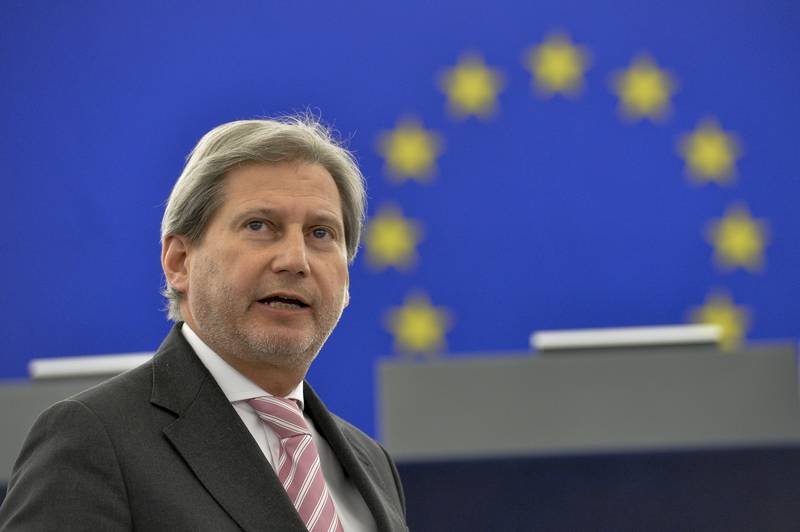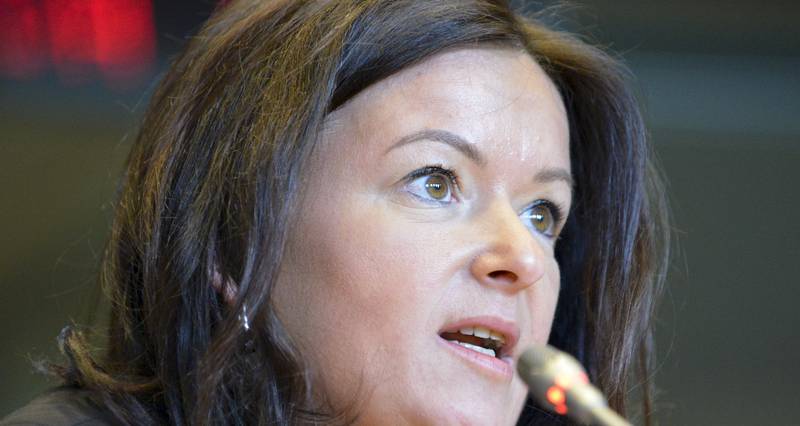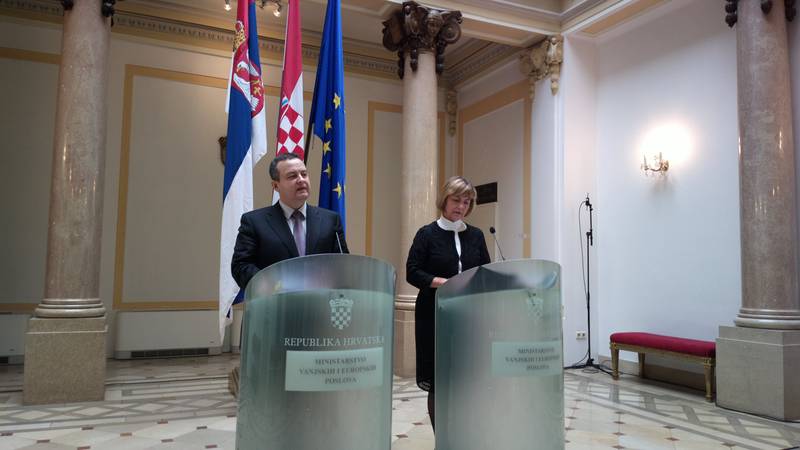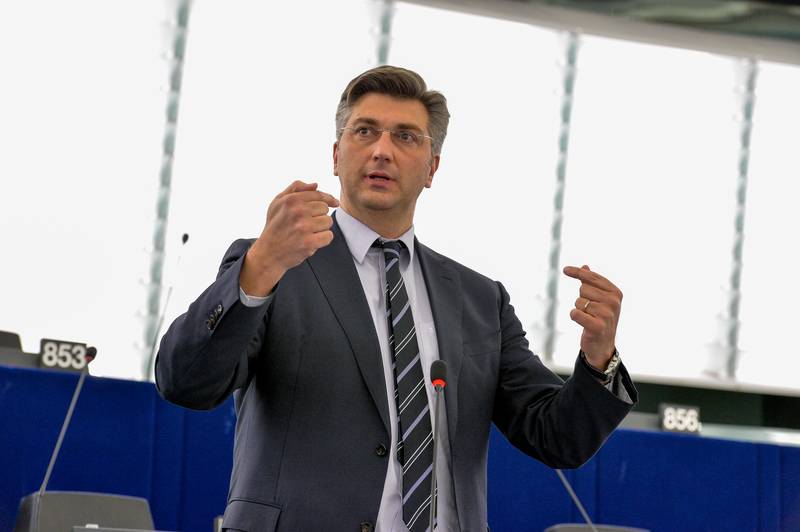Serbian-Croatian Relations Are Good ... for Now
Adelina Marini, March 16, 2015
 In the past almost three years, the relations between Serbia and Croatia are in constant tides and ebbs. At times, there is an improvement and perspectives emerge for resolution of the myriad of open issues between them, at others a new ghost from the past appears that immediately puts the good neighbourly relations to the test. Starting with the election of Tomislav Nikolic as president, who is a former comrade of Vojislav Seselj, a Serbian radical indicted of war crimes by the Hague tribunal, said a little before the elections in 2012 that Vukovar, which is the most painful place in Croatia's newest history, is a Serbian city. Pass through the acquittals of the generals Ante Gotovina and Mladen Markac and come to the release of Seselj and the refusal of the Serbian authorities to distance themselves from his statements that are scandalising the Croatian public domain.
In the past almost three years, the relations between Serbia and Croatia are in constant tides and ebbs. At times, there is an improvement and perspectives emerge for resolution of the myriad of open issues between them, at others a new ghost from the past appears that immediately puts the good neighbourly relations to the test. Starting with the election of Tomislav Nikolic as president, who is a former comrade of Vojislav Seselj, a Serbian radical indicted of war crimes by the Hague tribunal, said a little before the elections in 2012 that Vukovar, which is the most painful place in Croatia's newest history, is a Serbian city. Pass through the acquittals of the generals Ante Gotovina and Mladen Markac and come to the release of Seselj and the refusal of the Serbian authorities to distance themselves from his statements that are scandalising the Croatian public domain.
In the pauses between the appearances of historical ghosts, the Croatian left-liberal ruling coalition led by Prime Minister Zoran Milanovic, has been trying to play the role of a mature member of the EU who does not want to be a mentor of its former partners in ex-Yugoslavia but to share experience and to provide them actively with assistance to join the Union. Moreover, as a country whose membership several times hanged by a thread because of Slovenia's pressure to resolve old bilateral issues, Croatia decided that it would never behave like its north-western neighbour and voted in the Sabor (parliament) a declaration committing bilateral issues to never stand on the way toward the EU of any of the other countries from the Western Balkans.
On the other side of the border, in Belgrade, the right-left coalition led by Prime Minister Alexander Vucic, he himself with dark professional past, is putting enormous effort to create for the world and the region an image of a reformer and a person who looks ahead and not behind, of a pragmatist. So far, the interaction between the two governments, despite the drops, has scored progress. Two years ago, they have opened regular discussions on three groups of unresolved bilateral issues, working groups have been formed and high-level visits have become frequent. Visible is the will of both governments to circumvent the hampers for the sake of their common goal - Serbia to join the EU thus ensuring the security of the region. However, this is possible to change after the parliamentary elections in Croatia later this year if won by the right-wing opposition party Croatian Democratic Union (HDZ), led by the former chief of the Croatian counter-intelligence service, Tomislav Karamarko.
Since he took over the leadership of the party three years ago HDZ has begun to slowly move toward the far right. The nationalist rhetoric has increased, the war veterans have permanently taken the public attention having protested for more than 100 days now in front of the Ministry of Veterans, the name of the first president of independent Croatia, Franjo Tudjman, is frequently mentioned in a way that recalls of a personality cult. Last but not least, the Christian conservatism has grown stronger. All this was quite evident during the campaign for the presidential elections in the beginning of the year won by the HDZ candidate, Kolinda Grabar-Kitarovic, who, although supporting Serbia's EU accession, seems will be much more demanding that her predecessor Ivo Josipovic.
And as, practically, the election campaign for the parliamentary elections has already started, the battle is between the two largest parties - Zoran Milanovic's Social Democrats and Tomislav Karamarko's Democrats. This battle is being led not only on the domestic political stage but it has a significant impact on the country's foreign policy as well. At times, it can be said that Croatia has two command centres of the foreign policy - one is through Zoran Milanovic's government where for the foreign policy and the European affairs is responsible the first deputy Prime Minister Vesna Pusic, leader of the junior coalition partner the liberal Croatian People's Party (HNS), and the other centre is of HDZ which conducts its foreign policy through the president and its representatives in the European Parliament who have a solid presence in the foreign affairs committee and are remarkably active. Moreover, a deputy of theirs holds a key post in the foreign affairs committee - Andrej Plenkovic is a deputy chairman of the second most influential committee in the European Parliament and is a leader of the delegation for the relations with Ukraine.
The complicated case of Veljko Maric
About how powerful the influence of an opposition party can be over a national policy speaks the raising of the issue of the war veteran Veljko Maric by the HDZ MEPs during the debate on the progress report on Serbia. This issue has been present in Kolinda Grabar-Kitarovic's election campaign as well. From the very beginning of the discussions in the European Parliament after the Commission published its progress report, they have tried to impose a blockade on Serbia's EU accession because of this complicated case. Veljko Maric was sentenced in 2011 in Belgrade to 12 years in prison for war crimes. The problem is, according to the Croatian MEPs, that he was sentenced under a controversial law that imposes a regional jurisdiction and so far only national or universal jurisdiction is known. The debate late in the evening on Tuesday on the resolution passed almost entirely under the sign of the Veljko Maric case which created tensions in the hall.
 The criticism against the Croatian MEPs joined even the enlargement negotiations commissioner, Johannes Hahn, who urged, without explicitly mentioning the case, not to put requirements that do not exist in the European acquis or in the negotiations framework. "It's important bilateral disputes do not hamper the overall negotiations", he said. The Slovenian MEP Tanja Fajon from the Socialists and Democrats group directly attacked her Croatian colleagues, but, again, without mentioning the Veljko Maric case namely. "I'm rather concerned when I see general trends and pressure which have to do with issues which go beyond bilateral relations. The demand Serbia to review its law on war crimes is not part of the negotiations. Some European countries do have legislation of this kind. The Commission agrees with this. I would therefore suggest that you vote against this amendment. We should not use this theatre to try to gain national points", the Slovenian MEP concluded thus provoking a series of blue cards by the Croatian members.
The criticism against the Croatian MEPs joined even the enlargement negotiations commissioner, Johannes Hahn, who urged, without explicitly mentioning the case, not to put requirements that do not exist in the European acquis or in the negotiations framework. "It's important bilateral disputes do not hamper the overall negotiations", he said. The Slovenian MEP Tanja Fajon from the Socialists and Democrats group directly attacked her Croatian colleagues, but, again, without mentioning the Veljko Maric case namely. "I'm rather concerned when I see general trends and pressure which have to do with issues which go beyond bilateral relations. The demand Serbia to review its law on war crimes is not part of the negotiations. Some European countries do have legislation of this kind. The Commission agrees with this. I would therefore suggest that you vote against this amendment. We should not use this theatre to try to gain national points", the Slovenian MEP concluded thus provoking a series of blue cards by the Croatian members.
Their main defence is that it is not the very law on war crimes they are against but the fact that it creates a precedent with the introduction of a regional jurisdiction. This could be a threat to Slovenian citizens as well, warned Marijana Petir (EPP). She is known in Croatia as a very conservative politician. With the Croatian MEPs sided their Bulgarian colleague Angel Dzhambazki from the European Conservatives and Reformists Group, who used the case to remind about the situation of the Bulgarian minority in Serbia. Despite the disputes, however, the voted on Thursday resolution urges Serbia to review its law on the competence of the court that views war crime cases in a spirit of reconciliation and cooperation with its neighbours and the Commission. Commissioner Hahn, too, committed to have this issue in mind. "I fully understand the sensitivity of this matter and Serbia and its neighbours need to look into the future in spirit of regional cooperation and reconciliation", he said in the end of the debate which continued a little over than an hour.
A new life for the Serbian-Croatian relations
The issue was central also for the meeting between the first deputy prime ministers of Croatia and Serbia - Ms Vesna Pusic and Mr Ivica Dacic in Zagreb last week (11 March) . They met almost at the same time when the resolution was put to voting in Strasbourg. This was their first meeting after a pause, provoked by the release of Vojislav Seselj by the Hague tribunal. According to euinside sources, the meeting was supposed to take place in the autumn but was postponed precisely because of the tensions between Zagreb and Belgrade provoked by Seselj. According to Ivica Dacic himself, this was a regular meeting, "so, you shouldn't think that there are extraordinary reasons for our meeting".  Later in an interview with the Croatian television RTL he said that there was an agreement the meeting to be postponed to await the presidential elections in Croatia.
Later in an interview with the Croatian television RTL he said that there was an agreement the meeting to be postponed to await the presidential elections in Croatia.
Vesna Pusic announced in the beginning of their joint press conference, to which there was huge media interest in Zagreb, that "we have updated or drew a new life into our cooperation". "Our assessment is that the relations between Serbia and Croatia are very good despite the different views and issues, there is always an open channel for communication. This is a precondition for resolving the outstanding problems", she added and immediately went on to the Veljko Maric case. Ms Pusic recalled that Mr Maric was serving a sentence on the basis of the regional jurisdiction which is not known in the legal world and is not in line with the European standards. She insisted that Veljko Maric be transferred to serve his sentence in Croatia or his entire case to be transferred to the Croatian justice.
Ivica Dacic, in verbiage as usual, made it clear that Serbia is ready to show good will on this case. He recalled that Prime Minister Alexander Vucic personally committed with the resolution of this case by after a meeting with the newly elected president Grabar-Kitarovic, most probably, on the basis of humanitarian reasons. Mr Dacic, however, was surprised that the issue is фесхж raised now. No one ever criticised it before. "This law received the highest possible evaluations by those who studied war crimes. This law made it possible to indict 170 people for crimes committed on the territory of Croatia and Bosnia and Herzegovina. Only two of them are Croats. The rest are Serbs. If it was not for this jurisdiction they would have not been indicted, but as you said it yourselves, all these issues can be subject of discussions and a search of the best possible solution", the Serbian foreign minister added.
Responding to a journalistic question, he assured that if proved that this law is not in line with the European standards it will be amended. In this sense, his counterpart Vesna Pusic urged for the quick opening of chapter 23 of the accession negotiations under which all such issues can be resolved. In the beginning of the debate on the resolution on Serbia in Strasbourg, however, Commissioner Hahn said that these chapters could be opened in the end of the year, although the screening of the Serbian legislation will finish in the end of March. Ivica Dacic reminded in Zagreb that Croatia had voted a declaration with which it promises that bilateral issues will never be an obstacle for Serbia and Vesna Pusic confirmed that this has not changed. Will this remain the same after the elections in Croatia, however, remains an open issue, especially bearing in mind that Veljko Maric is just one of a myriad of unresolved postwar issues between Croatia and Serbia.
 These problems are divided in three groups. Two of them are related to the past and the war and the third one is related to the EU and Serbia's future membership. According to Vesna Pusic, work is ongoing on all the three groups of problems and Ivica Dacic assured that those are specific issues and that it is not about theories and philosophies. "Serbia's position is that the progress in the relations and the cooperation with Croatia is a priority. This is especially important for the stability of the whole region. Serbia wants to build good relations with Croatia. We are ready for a constructive political dialogue, for the creation of conditions to resolve all open issues. In this sense, we expect to accelerate the resolution of the open issues from the past". This is obviously offering a hand but also a very long and bumpy road. In order to walk it successfully it will be crucial the political will of the two countries to remain intact. It is also important the EU not to be a neutral observer because this has a lot to do with its common stability and security. A curious detail in this sense is that while, during the discussion of the Maric case in the debate on Serbia there was criticism against Croatia for using bilateral issues to block Serbia's EU path, whereas such criticism was spared against the Bulgarian or Greek MEPs during the debate on Macedonia.
These problems are divided in three groups. Two of them are related to the past and the war and the third one is related to the EU and Serbia's future membership. According to Vesna Pusic, work is ongoing on all the three groups of problems and Ivica Dacic assured that those are specific issues and that it is not about theories and philosophies. "Serbia's position is that the progress in the relations and the cooperation with Croatia is a priority. This is especially important for the stability of the whole region. Serbia wants to build good relations with Croatia. We are ready for a constructive political dialogue, for the creation of conditions to resolve all open issues. In this sense, we expect to accelerate the resolution of the open issues from the past". This is obviously offering a hand but also a very long and bumpy road. In order to walk it successfully it will be crucial the political will of the two countries to remain intact. It is also important the EU not to be a neutral observer because this has a lot to do with its common stability and security. A curious detail in this sense is that while, during the discussion of the Maric case in the debate on Serbia there was criticism against Croatia for using bilateral issues to block Serbia's EU path, whereas such criticism was spared against the Bulgarian or Greek MEPs during the debate on Macedonia.
 Kolinda Grabar-Kitarovic | © KGK
Kolinda Grabar-Kitarovic | © KGK Jozo Rados | © European Parliament
Jozo Rados | © European Parliament Aleksandar Vucic, Andrej Plenkovic | © Vlada RH
Aleksandar Vucic, Andrej Plenkovic | © Vlada RH